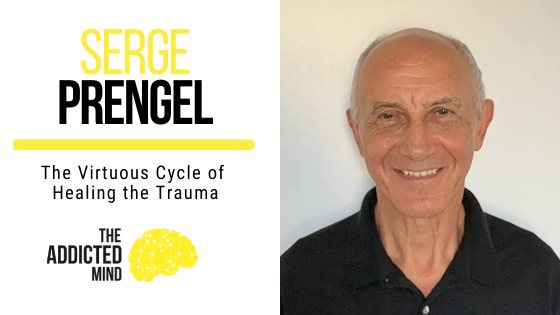On this episode of The Addicted Mind Podcast, Duane speaks with Serge Prengel, the author of The Proactive Twelve Steps for Mindful Recovery. They dive deep into the process of change and this concept of the virtuous cycle that creates a positive feedback loop in our lives so we can make the strategic change and create a meaningful life that feels good and is purposeful.
Serge is a therapist who’s big on experiential or somatic psychotherapy. He believes that everybody is very different and every situation is very different. Serge talks about how you can be proactive in your approach, and over time, gradually step out of feeling stuck and powerless so you can enjoy a balanced and happy life.
Serge has had a long-term dialogue with the 12 Steps for the past 30 years, which he discovered through friends who were in recovery. He always admired the power of the 12-step culture, the idea of having a common path, and the community it has created. He admires the system where people can have peer support and they can pull themselves together out of something that would feel like a morass.
That being said, Serge also had a problem with the 12 Step’s concept of reliance on divine intervention or higher power. However, at the same time, he sees that something is working. This led him to a path of going deeper into the dialogue around the 12-Step to get a better understanding of what works. Then he would be able to translate it so other people can understand it better and be able to follow the path more effectively.
In this episode, you will hear:
- A more generalized concept of healing
- His definition of trauma
- Building the tools through practice
- The importance of group work
- The inner power instead of the higher power
- How the felt sense experience functions as a guide
- The virtuous cycle of trauma healing
- The power of the mindful pause
- How the change starts to manifest itself
Key Quotes:
[09:55] – “It’s impossible to be a human being, without having had some situations and some experiences, which are beyond their capacity to digest at the time.”
[11:27] – “In the moment of being confronted with trauma as an individual, you’re exactly in the position where you’re disempowered, where you are with the least access to your capacities. And so it takes practical tools to actually overcome these kinds of moments.”
[12:08] – “We’re different people when different parts of the nervous system are in gear. And so, you cannot build the tools when you’re activated.”
[18:24] – “The inner experience of being saved by God is an inner experience that actually can be also experienced by people who don’t believe in God, and that’s progressively connecting to that sense of higher power.”
[24:31] – “Being more connected to ourselves is the healing, and the healing enables us to be more connected to ourselves. This is how we hit that virtuous cycle. And then the vicious cycle is that progressive cycle of disconnection.”
[25:34] – “When you’re in the midst of trauma, you cannot have access to that simplicity. What feels obvious when you’re out of it does not feel obvious when you’re in it.”
[27:17] – “That mindful pause becomes the DNA of the process because it’s something that moment by moment helps you orient but is also something that helps you stay and be progressively more able to accept.”
[32:59] – “Look for kindred spirits who are willing to engage in a process of healing together.”
Subscribe and Review
Have you subscribed to our podcast? We’d love for you to subscribe if you haven’t yet.
We’d love it even more if you could drop a review or 5-star rating over on Apple Podcasts. Simply select “Ratings and Reviews” and “Write a Review” then a quick line with your favorite part of the episode. It only takes a second and it helps spread the word about the podcast.
If you really enjoyed this episode, we’ve created a PDF that has all of the key information for you from the episode. Just fill in your information below to download it.

